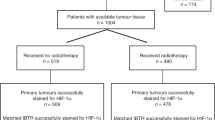Abstract.
Hypoxia affects many important processes in tumour progression and is a key feature in the tumour microenvironment that needs to be taken into account when evaluating prognostics and therapeutic options for cancer patients. Hypoxia-regulating proteins, i.e. hypoxia inducible factors (HIFs), and associated gene products have been linked to certain tumour behaviours and might be useful as prognostic and predictive markers. Recently, hypoxia-driven gene products have been launched as novel cancer treatment targets with the potential to increase tumour-specific effects. Breast cancer consists of a multitude of different diseases with certain common characteristics, but also clearly disparate behaviours and genetic alterations. In this review we will summarise the role of hypoxia in breast cancer and specifically outline the importance of hypoxia and HIF-1α regarding prognostic and treatment-specific implications. (Part of a Multi-author Review)
Similar content being viewed by others
Author information
Authors and Affiliations
Corresponding author
Rights and permissions
About this article
Cite this article
Lundgren, K., Holm, C. & Landberg, G. Common Molecular Mechanisms of Mammary Gland Development and Breast Cancer. Cell. Mol. Life Sci. 64, 3233–3247 (2007). https://doi.org/10.1007/s00018-007-7390-6
Published:
Issue Date:
DOI: https://doi.org/10.1007/s00018-007-7390-6




